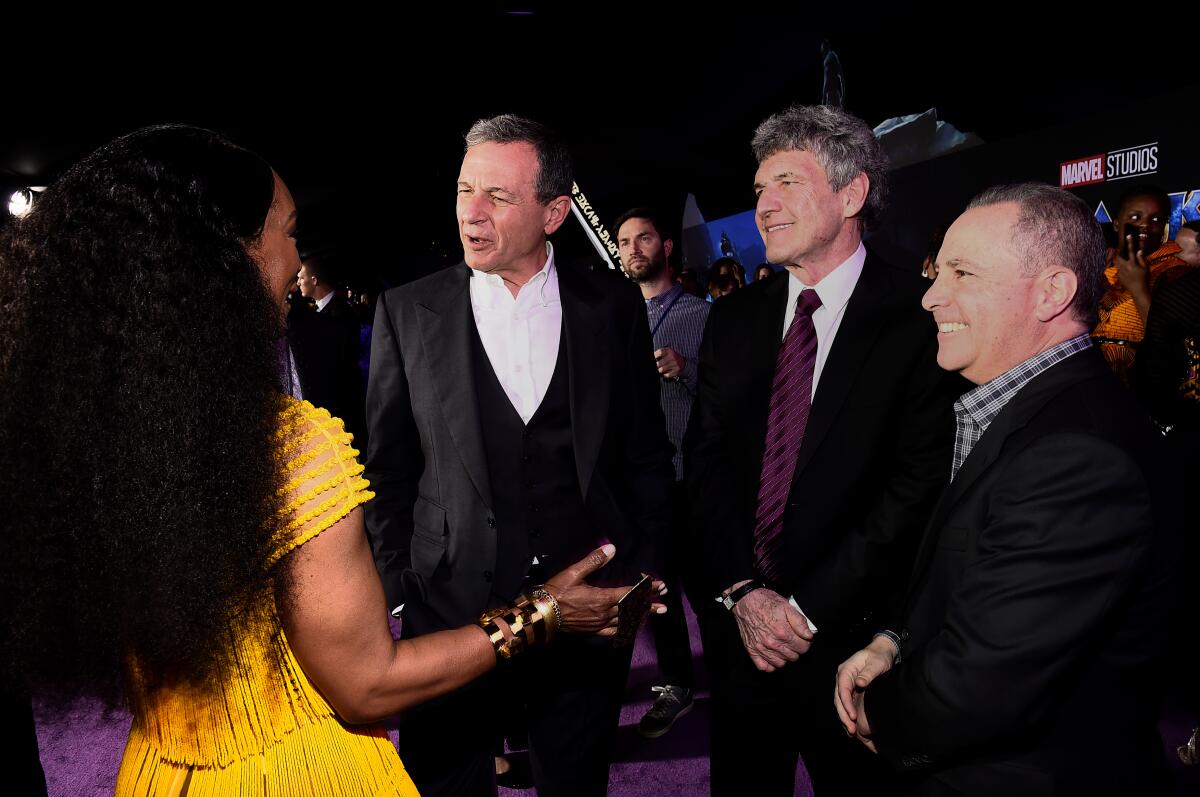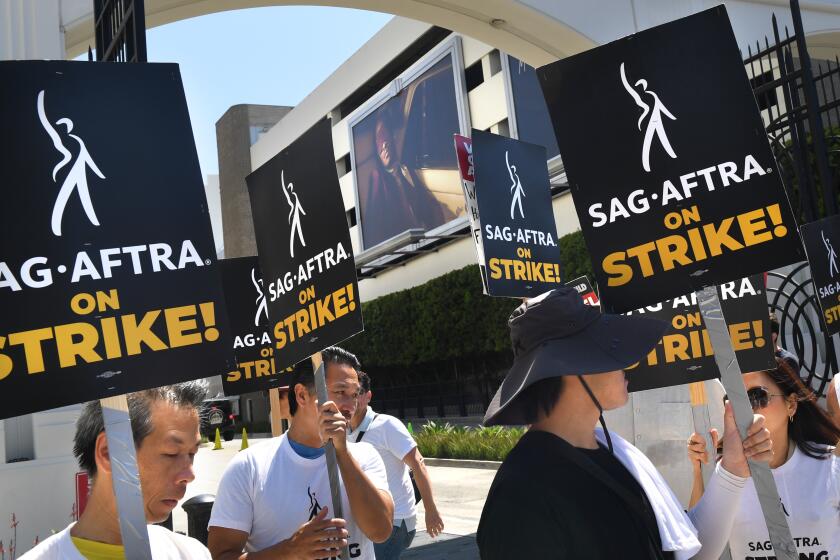Bob Iger, you beat Nelson Peltz. Don’t let Disney give in to his agenda on diversity

- Share via
Dear Bob Iger:
Congratulations on preventing billionaire Nelson Peltz and his band of “activist investors” from joining Disney’s board of directors.
Now please don’t hand Peltz a cultural victory by embracing his antiquated (read: racist, sexist, homo-/transphobic) notions of what future Disney products should look like.
He couldn’t have been more open about it: “Why do I have to have a Marvel that’s all women?” Peltz said of the Disney-owned superhero juggernaut in a recent, oft-quoted interview with the Financial Times. “Not that I have anything against women, but why do I have to do that? Why can’t I have Marvels that are both? Why do I need an all-Black cast?”
How about, “Because the stories demanded it”? Or, “Because for decades, Hollywood has drowned us in all-white and/or all-male movies and it’s beyond time that changed”?
In his six-month battle to stake a claim in the House of Mouse, Peltz criticized many choices made during the company’s recent history, which has been, as my colleague Meg James detailed this week, rather more than tumultuous.
The 2019 purchase of Fox, that year’s rather late-in-the-game launch of Disney+, the COVID-19 shutdown of the Disney parks and all film and television production, your decision to step away in 2021, falling stock prices, the struggles of your successor Bob Chapek, your subsequent decision to return in 2022.
Add to that industrywide downturns at the box office, revenue problems in the streaming space and the fallout from last year’s writers’ and actors’ strikes, and it’s safe to say that Disney still faces many very real battles.
Disney shareholders reject billionaire investor Nelson Peltz, who wanted changes, for a board seat. The hard-fought battle exposed Disney’s challenges.
Which is why Peltz’s continued insistence that part of the “problem” is Disney’s admirable push for more inclusive storytelling remains so alarming.
“People go to watch a movie or a show to be entertained,” Peltz also said in that Financial Times interview. “They don’t go to get a message.”
Many people, including you, have made similar statements as Hollywood has struggled to herd people back to the cineplex and navigate the splintered industry once known as television. And it’s complete and utter bulls—.
As you know, every movie (and TV series, play, book, painting, sculpture, piece of music) sends a message. Love conquers all, adversity can be overcome, with great power comes great responsibility, sometimes the bad guy wins, just because we can doesn’t mean we should, we’re all in this together — the message differs, and doesn’t always align with everyone’s worldview, but without messages, storytelling cannot exist.
To suggest otherwise implies that “entertainment” is, by definition, completely, and intentionally, mindless.
When people like Peltz say they want to be entertained, not lectured, by film, television and other forms of art, what they’re really saying is that they don’t want to be reminded that their experience, including their ingestion of a century’s worth of Hollywood projects, is not predominant or paramount.
They don’t want to be forced to think about a world that exists outside their (often incredibly narrow) ken.
Which is, of course, precisely what the best film- and television-making sets out to do.
For years, Hollywood for the most part insisted that stories should revolve around the victories and tribulations of white, straight men, even stories with the potential to expand one’s worldview. Yes, there were exceptions — there are always exceptions — but the numbers, both as percentages and in absolute terms, do not lie.
Even now, most movie leads remain white and male: In 2023, for instance, the percentage of movies with female leads or co-leads fell to historic lows, according to an annual USC Annenberg study of top-grossing films that’s been conducted since 2007.
Which means, drum roll please, that most films that flop revolve around white, straight men. But no one looked at, say, the box office disappointments of “Morbius,” “Ant-man and the Wasp: Quantumania” or “Indiana Jones and the Dial of Destiny” and thought, “Clearly the problem is too many white guys; better make some changes!”
Column: The studios thought they could handle a strike. They might end up sparking a revolution
With writers and actors on strike, the studios have a full-blown labor revolt on their hands — and they have no one but themselves to blame.
To use the term “message” when referring to films that feature women, people of color and/or members of the LGBTQ+ community only proves the sexism, racism and homophobia of the entertainment industry. What is the “message” exactly? That women, people of color and LGBTQ+ individuals exist? That they too have stories that deserve to be told?
Or that people like Peltz need to finally acknowledge that their demographic does not constitute, or control, the entire world?
Of all the mistakes Disney has made over the years, giving us a parade of nonwhite princesses; the superheroes of “Wakanda Forever,” “Captain Marvel” and (the very underrated) “Black Widow”; two female characters kissing in “Lightyear”; and a nonbinary character in “Wish” are not among them.
The box office disappointment that’s accompanied some of the more recent and diverse offerings from Marvel has more to do with superhero fatigue (among both audiences and creators) than the makeup of the cast.
As for the underwhelming returns of last year’s “The Little Mermaid,” even if you subtract the blatant racism that plagued the project from the moment its casting was announced, it must be noted that the performance of live-action princess films has been spotty at best.
So please, Bob Iger, don’t cater to the desires of the man you fought so hard to keep off the Disney board. Don’t fall for all the cultural chicanery implicit in the current use of the term “woke.” Backlash is an inevitable result of progress. It’s proof that change is actually happening.
Disney has always been about sending messages — that magic is real and should be embraced and celebrated by everyone. Not just a bunch of old, straight, white guys who think “entertainment” means it’s all about them.
You’ve won the battle. Now take your new board and win the war.
More to Read
The biggest entertainment stories
Get our big stories about Hollywood, film, television, music, arts, culture and more right in your inbox as soon as they publish.
You may occasionally receive promotional content from the Los Angeles Times.













